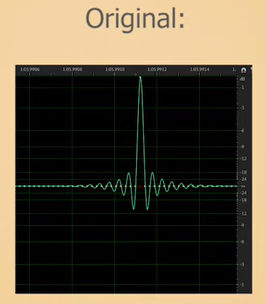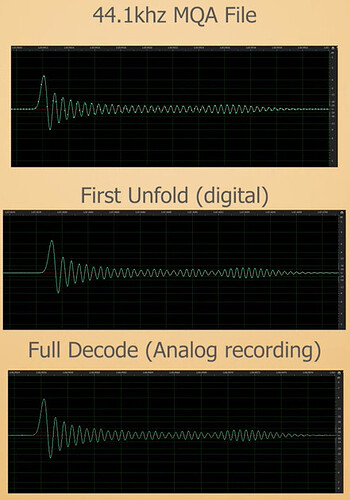No it doesn’t, it means it sounds So Right. It means what it says, it means it sounds like I expect it to sound if I were listening to real music.
You and I have never, in most cases, heard the original as we were not in the studio. Also sound is manipulated by the mix and mastering processes to create the illusion of a performance that reflects the artists vision.
So, sure MQA may well sound different to what you are used to. I consider MQA to be closer to a natural sound I would expect to hear based on much exposure to quality live music.
I continue to find myself aligned with Chris’s comment that MQA ‘sounds so right’, as I have come to understand that what I like about MQA is its ability to improve ‘tunefulness’ and ‘PRaT’, both of which I find enhances my experience of music. These are subjective assessments that are well captured by the phrase ‘sounds so right’. Others, perhaps those with a preference for italics, bold type and a feeling of certainty, may prioritise other aspects of the listening experience.
Where we agree is that this does not appear to be a product of the origami, as I find those qualities are present in 16/44.1 MQA streams from Tidal, which was very much to my surprise.
I, similarly, have posted on tracks that I have listened to, and one of the problems there is that it is hard to make a judgement on the musical values of music one doesn’t actually like. I would have a similar struggle with much of what Chris recommends…so if you could outline some broad/mainstream classical tracks that you have used for testing, I’d be up for listening to them (but please, no Brahms, Mahler, Shostakovich or Prokofiev. Or Schumann…perhaps here too we find tastes differ?).
One other aspect that might be worth flagging at this time, is why Tidal and Qobuz sound different, even before MQA enters the fray. Yesterday, in an idle moment, I decided to see why some prefer Squeezelite to Roon, using an Innous Zenith Mk II SE, SOtM trifecta and clock, Hugo 2 and Ether 1.1 headphones. Using Chailly’s marvellously produced ‘Petrushka’ via Squeezelite, I found the Tidal version clearer, and ‘crisper’ in the Shrovetide Fair section, and Qobuz rather soft and fuzzy, almost like ‘analogue’. I have yet to listen to this non-MQA album using Roon, for comparison, but these two versions did sound different. Perhaps because of different masters? Or second generation copies of masters? Or other factors to be discovered in streaming technologies?
I should also say that I didn’t particularly like what Squeezelite ‘did’…but that needs further testing. I would like to hear that version of ‘Petrushka’ in MQA though.
Here’s a review of Tidal vs Qobuz by Alpha-Audio in the Netherlands.
(I skipped first minutes because there was nothing).
One constant seems to be that both agree Qobuz (offering PCM only) sounds better than Tidal (offering both PCM and MQA).
One of the comments below the video:
- I chose Qobuz over Tidal a wihile ago because I find Qobuz less fatiguing to listen to -
I feel the sound is cleaner and less ‘artificial’.
I heard the marketing team of mqa claiming the exact opposite all the time. ![]()
Oh well, we know how mqa marketing works :
Stay safe everyone!
Fantastic stuff. I really admire the level of effort put into making that video.
Can’t help but feel this will be subject to legal action very soon - watch it now whilst you still can. It raises many more questions and highlights areas for deeper testing and investigation. Many of the MQA claims are now looking pretty shaky and the video conclusions are certainly legitimising the concerns that a lot of us have had for some time.
But, if you’re embedding data in the LSBs, then (while it’s pseudo-random — so acts like dither), you’re not at liberty to do noise-shaping (unless you are willing to sacrifice even more bits to that purpose).
I was expecting this to be posted here within seconds. Doesn’t appear to be the case, so here you go.
I’ve never cared about MQA but I do use Tidal because of Roon integration. Or did anyway. I cancelled after watching this video. Neither MQA nor Tidal come away looking good here. Don’t think I want to be sponsoring either at this point. No Qobuz in Canada, unfortunately, so I guess I’m switching to Spotify 320 for now. Hopefully their lossless tier will debut in Canada…
What a fantastic video, the explanations and testing are so detailed and on point.
The measurements tell all.
In fact, I have come to a very simple conclusion - MQA is just a lossy music file “enriched” by their own custom DSP - this is why it may sound “great” for some people, and “terrible” for others.
On the other hand, lossless files have the obvious advantages of not only being lossless, but also of enabling people to apply THEIR OWN DSP adjustments as they deem fit, thus not being hindered by a fixed DSP “tweak” imposed by MQA.
[checks in to see how the Bob Stuart Pension Fund Plan is doing]
Oh, right.
Well, that video is nicely laid out but most of the problems and issues raised there have been highlighted by people on this forum and elsewhere over the past few years.
I was pleased that he heavily reinforced my point about Tidal stifling choice for its subscribers by removing PCM versions, and that people should vote with their feet if they felt strongly about it. I guess that’s one reason why you posted it originally in my thread about Tidal’s current egregious policy.
As I have repeated ad nauseam, nobody minds if someone likes the sound of the BSEB (Bob Stuart Effects Box). Subjective is subjective after all. The removal of choice, obfuscation of provenance (which MQA ironically make grand claims for) and making technically untrue claims is far more concerning.
Wow. I’d be the first to admit that I don’t understand all the technical detail in the video, but it makes a compelling case. I’ll be interested (genuinely) in how the pro-mqa brigade explains this, hopefully without just resorting to subjective claims about perceived sound quality.
It’s hard to know but concerns about mqa seem to be growing, on this forum, in other forums, in YouTube comments, and elsewhere. I wonder if this starts to affect Tidal in any meaningful way. Or even Roon - how sustainable is it to claim audiophile credentials if one of your two streaming services is demonstrably lossy.
If mqa doesn’t offer better sound quality then I don’t see what it offers. It just doesn’t seem to serve any purpose.
My 2 cents on MQA is;
I’ve looked into MQA and have formed the opinion that I’m not keen on it. I’ve seen various videos, read various articles where it’s claimed MQA is a lossy format not lossless like FLAC. Having seen analysis of MQA tracks compared to a FLAC of the same hi-res 24/192 I can seen they are not similar at all and looks like the MQA version has been messed with.
MQAs main reasoning for its existence is to reduce bandwidth. To reduce data consumption. I have unlimited 500mbps cable broadband and unlimited 5G mobile data. Bandwidth and data consumption doesn’t affect me and probably doesn’t affect many. Tidal who uses MQA allows for off-lining on a mobile device. Bandwidth must be a Tidal issue or other service provider of MQA music streams. If I could I’d have 100% lossless audio whether it be redbook or hi-res. I ripped 3000 CDs once to WAV totally lossless and it used over 2TB of storage. This was when a 1TB hard drive costed £200. I didn’t rip the other 6000 CDs and instead started streaming.
After watching this - https://youtu.be/NSv0lcHlawk I was less than impressed with MQA as an organisation. Which I turn impacts on my choice to cancel my subscription with Tidal. Although this was 2 years ago I feel sorry for Chris, The Computer Audiophile. How he kept calm and well mannered is amazing.
There is a form of etiquette in these type of presentations which MQA didn’t observe and disruptive to say the least.
To my ears MQA doesn’t sound better than FLAC of the equivalent quality and although I have a MQA full decoding DAC it only cost £400. I wonder how much of that went to MQA.
And that is the point. I don’t mind paying for music and equipment but I’m not keen on paying a Toll charge for the pleasure. I guess that’s the only way I can describe MQA, a Toll charge format.
Selection Bias. Those that dislike MQA are more likely to comment against it than those who support it. This is especially true in light of the Goldensound video that was posted as it supports their opinion of MQA. There’s a lot of chest thumping right now. Given how people who like MQA—and express those views publicly—are treated on Internet forums, I wouldn’t post my preference for it, even if that was my opinion.
LMFAO ![]()
Do you know who Currawong is?
Is he the guy who -relying on a 2017 press release- thought HighResAudio didn’t sell MQA?
I’m nobody special. Please don’t use me as an appeal to authority argument, as I’m not an expert on anything. I’m just someone with an informed opinion, and took the time (and still do take the time) to look into things in which I’m interested.
It’s very entertaining to see what MQA does to the originally encoded music data and relate that to comments of some proponents of the format in the discussions about the merits of audiophile switches, isolators, cables of all sorts and other such tweaks, as well as others that generally detest manipulation of the ‘bit-perfect’ music by doing DSP room correction while endorsing said format.
I’m glad having cancelled Tidal and switched to Qobuz about a year ago…



